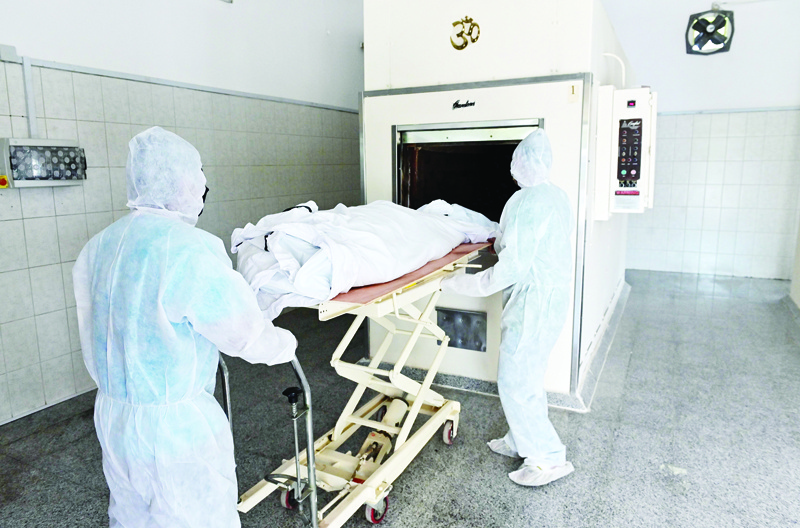
DUBAI: The body of the Indian migrant who died from coronavirus far from home was kept inside the ambulance in front of the crematorium in case a friend came by for a last goodbye. But nearly an hour later no one had appeared, and the workers in protective suits had to carry out their grim task. In silence, the four men carefully moved the body, wrapped in a white plastic bag, to a furnace where it was reduced to ashes that were placed in a silver box.
Millions of foreigners work in the United Arab Emirates and across the other wealthy Gulf nations, providing the backbone of the workforce in hospitals and banks, as well as on construction sites and in factories. Many have spent decades toiling to provide for their families, with the hope of returning one day to open a business or build a house. But a death from coronavirus means that the body cannot be sent home, and that it has to be cremated or buried in the country where the person dies.
"The whole world is changing. Nobody comes anymore, nobody touches, nobody says goodbye," said Ishwar Kumar, a manager of the Hindu Cremation Ground located in a desert area south of Dubai. Before coronavirus "people would come here, around 200 to 250, to grieve and bring flowers. Now they die alone," he told AFP. The majority of the 166 deaths and 26,600 registered cases in Gulf countries so far have been foreigners, according to health ministries, most of them from Asian countries like India, Pakistan, Bangladesh, Nepal and the Philippines.
A few hours before the cremation of the Indian man - aged in his 50s and a partner at a tourist company in Dubai - the body of another victim, a 40-year-old Filipino beautician, was also cremated at the facility. Both had one thing in common on their death certificates - "covid pneumonia" as the cause of death. The silver boxes, bought from a hypermarket, are handed over to the next of kin if they are in Dubai, or to the embassy.
"They work as laborers so most of them don't have family members. Sometimes their work colleagues come," said Suresh Galani, another manager at the facility. Despite halting commercial flights to stop the spread of the pandemic, governments in the region have been trying to lay on repatriation flights for foreign workers who are now out of a job as the economy grinds to a halt. But dealing with victims' bodies is another challenge, as the presence of the contagious disease means that burial or cremation has to take place immediately.
In Saudi Arabia, according to a source in the health ministry who spoke to AFP on condition of anonymity, "until now all the families are asking to bury the bodies inside Saudi because they prefer so". Among them was Wazir Moahmed Saleh, a 57-year-old Afghan who worked and lived in the Muslim holy city of Madinah since the 1980s after he fled his country during the war with the former Soviet Union. The stationery shop owner died of coronavirus last week.
He had family in the holy city where the Prophet's (PBUH) grave is located, but had to be buried with only four people in attendance - all his sons. His nephew Amed Khan, a sales agent born in the kingdom, could only look at photos and videos of his uncle's burial on a smartphone. "His dream was to be buried in Madinah, and his dream came true," he told AFP. "There isn't a person who dies in Madinah and would want to be buried elsewhere. This land is known to be part of heaven."
At the Hindu cremation facility in Dubai, not all coronavirus-related deaths have the name of the virus on their certificates. Vijay, an Indian national, said his 45-year-old brother Ram died of a heart attack after he sank into a severe depression during a 14-day quarantine following a direct contact with someone who had the virus. Standing near the body in the cremation room, under a white ceiling fan, four of his colleagues spread flowers on the body before it was reduced to ashes.
"Ram tested negative after he stayed in a room for two weeks. He was mentally hurt and he got depressed because he stayed alone," Vijay explained. The laundry worker and father of three died in an ambulance while he was being taken to hospital after suffering severe chest pain. "We are going back tomorrow to collect the ashes. We will send them home once the flights are back," his brother said. - AFP

